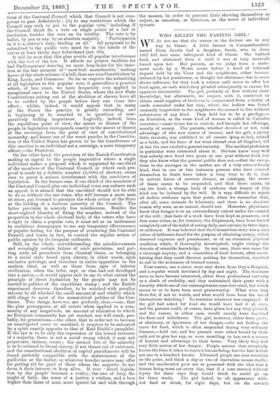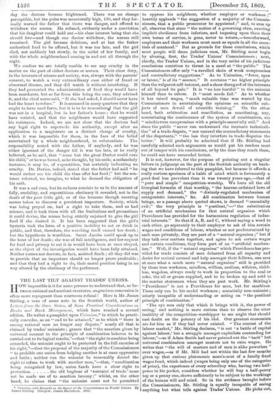WHO KILLED THE FASTING GIRL?
WE do not see that the nurses or the doctors are in any way to blame. A little farmer in Carmarthenshire named Evan Jacobs had a daughter, Sarah, who in June 1867 fell into some infrequent kind of illness. She loathed food, and abstained from it until it was at long intervals forced upon her. Her parents, as we judge from a state- ment made by a Welsh nurse before a kind of informal inquest held by the Vicar and the neighbours, either became irritated by her persistence, or thought her abstinence due to some divine influence, for they took a solemn oath never to offer her food again, an oath which they pleaded subsequently in excuse for apparent inhumanity. The girl, probably at first without their knowledge, but afterwards, we suspect, with it, contrived to obtain small supplies of food—as is conjectured from a bottle of curds concealed under her arm, where the hollow was found unusually large=but to the neighbours she seemed to live without subsistence of any kind. They held her to be a prodigy,— an Exstatica, as the same kind of woman is called in Catholic countries,—came to see her in crowds, and brought her offerings, usually of money. The parents, whether deceived or not, took advantage of this new source of income, and the girl, a pretty little creature, was exhibited to all comers lying in bed, attired as a bride, and the fame of her went abroad over all England, till at last the case excited a general curiosity. The medical profession in particular were interested about it. Doctors know very well that nobody ever lived two years or one year without food, but they also know what the general public does not,—that the excep- tions to the averages in the matter are of a very extraordinary kind, that in one or two instances persons who have starved themselves to death have taken a long time to do it, that in certain forms of nervous disease, as catalepsy, the waste of tissue seems to be suspended, and that there exists, to say the least, a strange body of evidence that trance of this kind can be induced by the will. It is very difficult to reject all Indian evidence upon that point, when we remember that, after all, some animals do hibernate, and there is no absolute reason why man, as an animal, should not. Moreover, physicians know that hunger is to an extraordinary extent under the control of the will ; that fasts of a week have been kept as penances, and that some tribes, as, for instance, the Esquimaux, have been forced completely out of the habit of eating daily, and eat once in three days, or seldomer. It was believed that the Carmarthen story was a case either of deliberate fraud for the purpose of obtaining money, which deserved exposure and punishment, or of an abnormal physical condition which, if thoroughly investigated, might enlarge the domain of scientific knowledge. In any case, there was cause for a thorough inquiry, and a committee of local doctors, after ascer- taining that they could discover nothing for themselves, resolved to call in the assistance of trained nurses.
Four nurses, one a sister, were sent down from Guy's Hospital, and a regular watch instituted by day and night. The watchers seem to have become interested, either from professional curiosity or a shade of credulity, and they maintained their posts with a tenacity which one of our contemporaries considers cruel, but which seems to us to have been most praiseworthy. What were they there for, if not to watch, and what would have been the use of intermittent watching ? No restraint whatever was employed. If the girl had asked for food she would have had it at once, and the parents could, of course, have given her any they pleased, and the nurses, in either case, would merely have reported the facts and withdrawn. The girl, however, either from prid", or obstinacy, or ignorance of her danger,—she not feeling the crave for food, which is often suspended during very ordinary illnesses,—held out, and her parents were either bound by their oath not to give her any, or were unwilling to lose such a source of honour and advantage to their house. Very likely they had very little notion of her danger. People assume that everybody knows the time it takes to starve a human being, but the fact is that not one in a hundred knows. Educated people are over-sensitive on the point, and think a day or two of starvation means death ; and the uneducated poor are so possessed with the idea that a
human being must eat every day, that if a man starved without injury for three days they would think he could go on for three weeks. The girl lasted, to all appearance with- out food or drink, for eight days, but on the seventh
day the doctors became frightened. There was no change perceptible, but the pulse was unnaturally high, 160, and they for- mally warned the father that there was danger, and offered to withdraw the nurses. He refused, evidently under a conviction that his daughter could hold out—his clear interest being that she should live—and though one doctor withdrew, the nurses still remained. The girl became delirious, and at last the father authorized food to be offered, but it was too late, and the girl died, not suddenly but slowly, in the midst of her family, and with the whole neighbourhood coming in and out all through the night.
We confess we are totally unable to see any cruelty in the matter on the part of either doctors or nurses. Their clear duty, in the interests of science and society, was, always with the parents' consent, to watch a very extraordinary case either of fraud or abnormal disease, and they did watch it without interfering. If they had prevented the administration of food they would have been murderers, but so far from this being the case, they advised it, and the chief nurse said, "If she had asked, I should never have had the heart to refuse." It is assumed in many quarters that they ought to have used force, but it is to be remembereil that the girl was not in a hospital, but in her father's house ; that he would have resisted, and that the neighbours would have supported his resistance. Indeed, we are not clear that the doctors had any legal right to supersede his authority, except after an application to a magistrate on a distinct charge of cruelty, which it was impossible for them, in the face of the belief entertained by a whole neighbourhood, to substantiate. The responsibility rested with the father, if anybody, and he was either ignorant of the danger till it was too late, or he really believed, as he said, that " none but the great Doctor could cure his child," or he was bound, as he thought, by his oath; a melancholy instance, it may be, of superstition, but certainly indicating no -cruelty. Dr. Davies, indeed, stated that the father had said " he would rather see his child die than offer her food ;" but the sen- tence referred, we imagine, to what he deemed the obligation of his oath.
It was a sad case, but its sadness consists to us in the amount of folly, credulity, and superstitious obstinacy it revealed, not in the death of the poor little girl, or of the humane though unerring means taken to discover a persistent imposture. Society, which was being preyed on, had a right to take them, and so had science, and it took them with all the limitations and precautions it could devise, the nurses being strictly enjoined to give the girl food if she desired it. It has been suggested that the girl's hysteria took the form of a positive inability to eat or drink in public, and that, therefore, the watching itself caused her death ; but the hypothesis is worthless. Sarah Jacobs could speak up to the hour of her death ; she was of full intelligence, and her request for food and privacy to eat it in would have been at once obeyed, as the object of the investigation would have been fully attained. Neither nurses nor doctors, in fact, assisted death ; all they did was to provide that an imposture should no longer prove profitable ; and that they had a right to do, their moral position being in no way altered by the obstinacy of the performer.



































 Previous page
Previous page